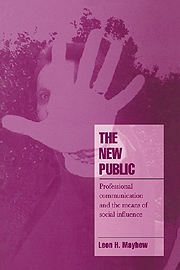Book contents
- Frontmatter
- Contents
- Preface
- Part I Rhetoric and the integration of society
- Part II Influence
- Part III The New Public
- 7 The emergence of the New Public: advertising, market research and public relations
- 8 Political communication in the New Public
- 9 Forums for the redemption of influence
- 10 The rhetoric of presentation
- Notes
- References
- Index
8 - Political communication in the New Public
Published online by Cambridge University Press: 06 September 2009
- Frontmatter
- Contents
- Preface
- Part I Rhetoric and the integration of society
- Part II Influence
- Part III The New Public
- 7 The emergence of the New Public: advertising, market research and public relations
- 8 Political communication in the New Public
- 9 Forums for the redemption of influence
- 10 The rhetoric of presentation
- Notes
- References
- Index
Summary
Contemporary political consulting is a direct outgrowth of public relations and the methods of influence developed in advertising and market research. Political advising is as old as politics, and advising about electoral strategies and tactics began with the first mass elections. Andrew Jackson's friend and political associate John Eaton helped shape Jackson's image in 1824 with a campaign biography that “turned a conservative planter and slave holder into the idol of the common man” (Melba Hay in Schlesinger 1994, 94). Eaton promoted Jackson as a man of the people who would restore to public life the virtue implicit in his military leadership (Remini 1981, 75–8). The tradition of republican virtue and its binary oppositions to corruption and loss of liberty was not dead. In 1828, Jackson's campaign operatives mobilized support by organizing public endorsements at staged events by methods not unlike those used in twentieth-century public relations, but Jackson's managers were party loyalists, embedded in the newly emerging party organization of that era, not professional consultants working directly for the candidate and employing the science as well as the lore of campaign management. Full-time professional consultants originally appeared on the political scene a century later to direct a 1933 campaign against a non-party California ballot initiative.
The rise of political consulting
The origins of independent campaign management. The firm of Whitaker and Baxter was the first player in the new political game that transformed so-called “advisers” into authoritative managers of political campaigns.
- Type
- Chapter
- Information
- The New PublicProfessional Communication and the Means of Social Influence, pp. 209 - 235Publisher: Cambridge University PressPrint publication year: 1997

